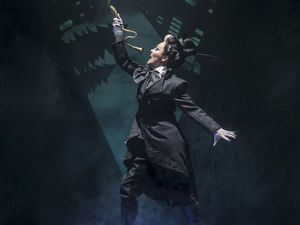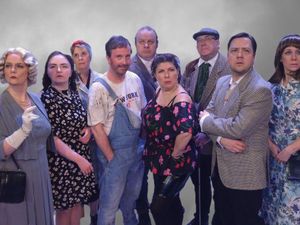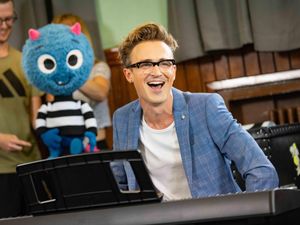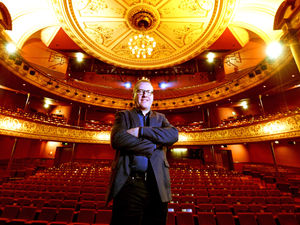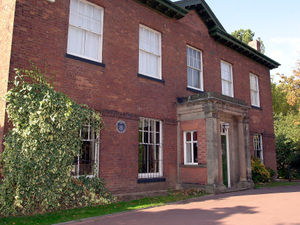Des O'Connor and Jimmy Tarbuck talk ahead of Wolverhampton Grand Theatre show
There were demanding audiences, hard-to-please audiences, and even downright hostile audiences. And then there was the Glasgow Empire.
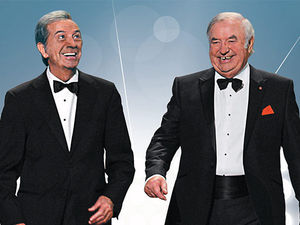
Known as 'The English Comic's Grave', the Empire was infamous for its curmudgeonly audiences. Mike and Bernie Winters, Bob Monkhouse, Morecambe and Wise, and Tommy Cooper had all gone down like a lead balloon, but it was the reaction to a young Des O'Connor which went down in comedy folklore.
When Des, and fellow veteran funnyman Jimmy Tarbuck, appear at Wolverhampton Grand Theatre on Saturday, the two comedy legends are guaranteed a warm reception. But it wasn't always like that.
"Nobody every told me the national sport in Scotland at that time was to go to the Empire on a Friday night, and wait for the English comic," he mused, recalling the infamous night early on in his career.
"I was actually hearing the silence."
He remembers how, for some unknown reason, he was called to the stage earlier than expected, and was completely unprepared.
"I was dragged from my room, half made up, my hair half done, and I was about as funny as a road accident," he said.
"You can hear a silence, and it gets louder and louder.
"It was that quiet, there were 3,000 people watching me, and I thought 'I don't need this, I'm going to faint'."
So he crashed to the floor, before being dragged off the stage through the curtains, the soles of his shoes the last thing to disappear, and a confused musical director peered over the lid of his piano and asked: "Is this part of the act?"
O'Connor was taken to a nearby hospital for a check-up, where his agent told him to hurry up and get back to the theatre, because he had another show to do.
O'Connor and Tarbuck are a dying breed, throwbacks to an era when working-class comedians would spend decades honing their skills in the unforgiving world of working men's clubs, holiday camps, and small provincial theatres.
While the two funnymen hailed from the opposite ends of the country, they both lived remarkably parallel lives. Both had passion for football, both held down a variety of jobs before finding fame, and both discovered a taste for showbusiness while working as Redcoats at Butlins. Both also enjoyed considerable success in the pop charts, even if their singing careers sometimes made them the target of other people's jokes.
O'Connor, born in the tough East London suburb of Stepney in 1932, was evacuated to Northampton during the Second World War. He enjoyed a brief career as a professional footballer for Northampton Town. The son of an Irish father and Jewish mother, he once joked that he was the only O'Connor in history to have attended a Bar Mitzvah.
After completing his National Service he took up a job as a shoe salesman, giving him plenty of practice at polishing the patter which would serve him so well during a long and varied career.
Tarbuck, eight years O'Connor's junior, grew up in the Wavertree area of Liverpool, where he was a classmate of John Lennon. By his own admission he was a bit of a rebel as a teenager, expelled from his strict Jesuit school for defying his teachers, and getting sacked from his job as an apprentice mechanic for 'fooling around'.
"I was always one of these kids who had the smart back-answer in school – a right hard-faced, cheeky young man," he said when he appeared on Desert Island Discs.
After spells working in a launderette, hairdresser's and installing television aerials, it was a trip to Butlins at the age of 18 where he found his true role in life.
To impress friends he entered a talent contest at the holiday camp, and his genial manner and acerbic wit took him all the way to the final in London. A week later he joined a touring rock'n'roll show.
As television replaced the cinema as the main form of entertainment for the masses in the 1960s, comedians like Tarbuck and O'Connor – and Morecambe & Wise, Mike & Bernie, or Bruce Forsyth for that matter – became the new showbiz royalty. Their versatility, which saw them switch seamlessly from singing, to stand up, to interviewing other up-and-coming acts, made them ideally suited to the growing appetite for variety show on TV.
These were the boom years for working men's club circuits too, where thousands of comics would hone their crafts, appearing every Friday or Saturday night before the harshest critics of all – the paying punters.
By the 1970s, the club scene was so vibrant that it spawned one of the most popular television shows of the decade. The Comedians, which launched in 1971, was made up of tightly edited clips from club comedians from all around the country. At the height of its success, it pulled in more than 20 million viewers every week, and turned Jim Bowen, Frank Carson, Mick Miller, Stan Boardman and Charlie Williams into overnight sensations, and put Walsall-born Ian 'Sludge' Lees on the road to fame.
Boardman said: "People enjoyed the show and every comedian was a larger-than-life character – it made stars of working-class men like Frank Carson, who used to be a plasterer.
"I did shows all over – the phone never stopped ringing. I had bookings from Spain to Australia to Dubai, and a 10-year stint doing my show in Jersey."
Like fellow Liverpudlian Tarbuck, Boardman discovered his talent for comedy at a Butlins talent show, which he reluctantly entered at the request of his children.
It led to an appearance on BBC talent show Opportunity Knocks – which along with its ITV rival New Faces – gave countless young performers their big break.
Ironically, it was an appearance on the Des O'Connor Show that would kill Boardman's TV career, although he continued to perform on the club circuit. In the mid-1980s, at the height of his fame, Boardman was invited to appear live on the prime-time variety and chat show, where he turned the air blue with a word-play on the name of the German Focke-Wulf war plane. The joke, which left O'Connor looking startled with his head in his hands, led to him being banned from appearing on ITV. Boardman was unrepentant, saying that nobody complained about the Amerian comedy film Meet The Fockers.
West Midland entertainment promoter Brian Yeates, who has worked with some of the biggest names on the comedy circuit in a long and varied career, says the comedy scene today has changed beyond all recognition compared to the days when the likes of Tarby and Des O'Connor plied their trade.
"The venues are no longer there," he says.
"When Jimmy Tarbuck and Des O'Connor were working the club circuits, there was the Dolce Vita (nightclub in Birmingham), the King's Theatre, and The Talk of the North and The Talk of the Midlands.
"These clubs aren't around any more, that's why they are working the theatres.
"It was a different world then, there wasn't any social media for a start."
His son Ashley, who works with many of today's up-and-coming comedy acts, says there are still venues around, but like the music industry it has become more fragmented.
"You have comedy clubs, like the Glee Club in Birmingham, and there are a lot of comedy clubs in the backrooms of pubs," he says.
"I would say there are more comedians around now than there were in the past, but there is probably more variation in the quality.
"That said, the biggest comedian in the world is Peter Kay, and I would say he is very much the old-school northern stand up, so there is still room for those sort of acts.
"You have people like Tim Vine, Gary Delaney and Jimmy Carr, he tells gags although he is a little bit bluer."

